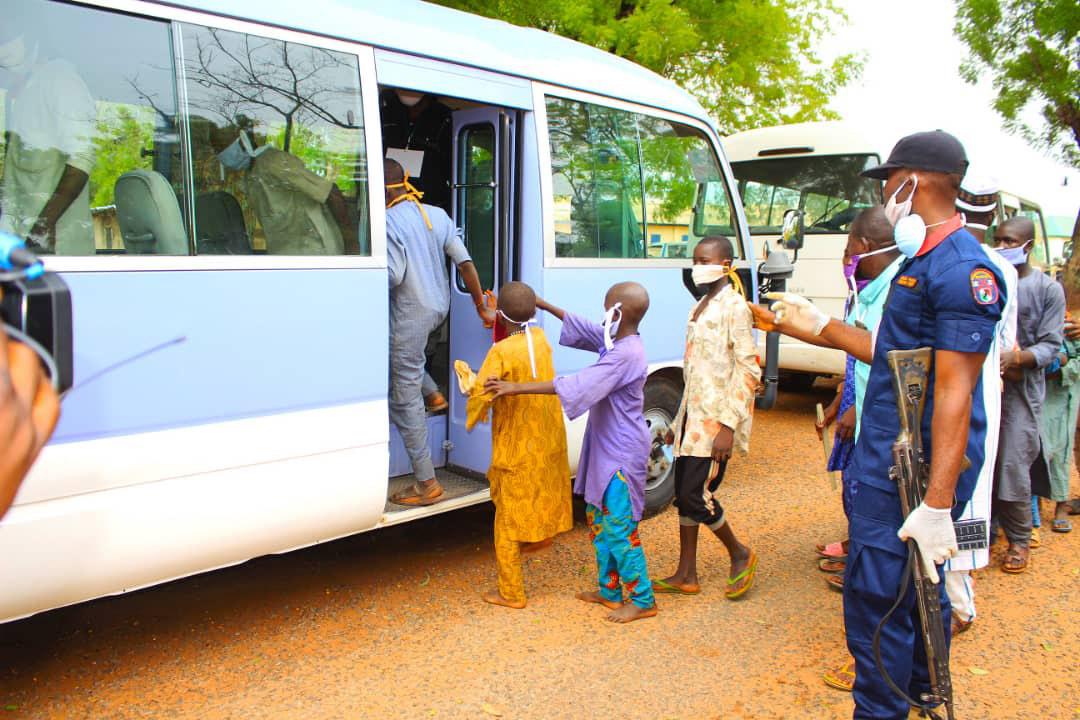Given the advertised compassionate disposition of Governor Ben Ayade of Cross River State to the down-trodden, he is not likely to ever forgive himself if the women and female children of Becheve community in Obanliku Local Government Area of the state continue to live in bondage after he must have served his term in office.
Incidentally, the Becheves are relatively close neighbours of Ayade’s Kakum people of Obudu Local Government Area. Obanliku used to be part of Obudu until the early 1990s. Becheve clan is situated along the fringes of the Obudu Ranch Resort and as such not too far away from modernity, but the people seem to be very far away from civilisation.
The clan has about 17 smaller hamlets scattered around the Sankawala Hills which form part of the Cameroun Mountain range. They live within the surrounding plains and valleys around the area close to the Obudu Plateau where the ranch resort is located. The Becheves are becoming notorious not for their farming and hunting skills but for something most bizarre – giving out of little girls as collateral to Shylock money lenders. This has become the pastime of greedy parents who wish to live above their means or the predicament of those forced by circumstances to be in debt.
The practice involves handing over very young females, including infants, to offset any kind of loan, or as appreciation for a good turn rendered to the family, or as advance payment for whatever favours that may be required in future. It could even be for purely status conferral, to be seen as an in-law of a prominent man. The child in the womb is not spared. If it eventually comes out to be female, she is as good as sold out already.
Advertisement
The Becheves seem to “value” the female child much more than the male, in an uncanny way. The male might turn out to be just a farm hand and, or hunter which are the predominant occupations of the people, but the female is sure collateral for past, present and future indulgences of the parents or family. She becomes the breadwinner for the family even though she might not taste the bread.
The moment a girl is handed over for Money Marriage, she is considered out of the family. She is warned never to return no matter how badly she is treated in her new home. If she dare makes any attempt, her parents will ensure she is bundled back to the husband’s place before nightfall. Sometimes, that “abominable” act could attract far reaching implications, as far as her family’s debt status is concerned.
Mothers seem to have very little choice in the matter. Some even enjoy the benefits of the despicable exchange programme and so have absolutely no compunction about it. They turn in-laws into jackpots at the expense of their suffering daughters. The men see it as a status symbol and go about with some airs that they have a Money Wife or wives. So there is hardly any family in Becheve without a Money Woman – either as donor or receiver. The custom itself is called Money Marriage.
Advertisement
Parents do not care about the psycho-emotional effects of this indulgence on the children. The victims are usually indoctrinated by their parents into believing that being a Money Wife is a prestigious engagement. It is only when they get to the master’s house that they realise that it is not actually marriage but some kind of slavery, with hard labour. They work in the farms and are treated as slaves, not as normal wives. Once in, it is almost impossible to get out, even if the direct beneficiary is no more.
Poverty may have triggered the practice in the days of old, but it has become an addictive indulgence which the people have found very difficult to abandon. They often justify and blame it on poverty even though the zeal with which they indulge exposes the poverty facade. Families take pride in it and are boastful about it, but the victims live with the trauma inflicted on them for life.
Visitors are usually shocked that in this time and age, people are still engaged in acts that see human beings as a means of exchange for goods and services. It was not the act itself that baffled Itam Ekpe, one of the journalists who visited the place in 2018, it was the nonchalant disposition of the people. She could not comprehend a situation where parents would gladly give out their barely grown baby girl to a man old enough to be her father for a morsel of corn or in exchange for chicken-change which the family borrowed but could not pay back.
Itam would not be the first to receive such a culture shock, a number of other persons and groups have. Media organisations, including television houses, have tried to bring this bizarre tradition to the attention of the authorities in the state, but it’s like the authorities are apprehensive of shifting the rock of ages.
Advertisement
A Christian missionary running the Faith House Mission in northern Cross River, Richard Akonam, did a book and a short documentary on the matter some years ago and tried to draw the attention of the relevant authorities in the state to the unwholesome practice, but it seems they prefer letting the sleeping dog enjoy its siesta.
Some time ago, the wife of the state governor, Mrs Lynda Ayade, is said to have sent a fact-finding team to Becheve when her attention was drawn to the situation. The team went there but the rest would qualify for a long story. In summary, no follow-up, no action! A lady who reportedly sympathised with the plight of the children, and offered to assist in rehabilitating those rescued by missionaries, almost burnt her fingers in the process. She had to hands off when state agencies misconstrued her intentions.
If not that Itam mentioned the issue again recently during a casual conversation, it would have been assumed that some action must have been taken by state actors; but no dice. “Ever since my team – the Nigerian Association of Women Journalists (NAWOJ) comprising Channels TV, NTA, Voice of Nigeria, among others, went there and made extensive reports, nothing has been done”, she lamented. That trip was in May 2018, two years ago.
In the same month, Channels TV did a report on “Becheve: where girls are sold into marriage for debts’ settlement.” The report indicated that right in the heart of the Becheve communities are pitiful stories of young girls being sold into marriage in exchange for domestic animals, food items, and for settlement of their parents’ debts. The debt may just be pittance, but the parents would prefer to give out the child than make efforts to repay. The value depends on the bargaining power of the parents and the insistent nature of the lenders, in the case of money, or even foodstuff. A victim confirmed to a media organization that their purpose in the marriage is to work like labourers on their husband’s farms.
Advertisement
Akonam stumbled on this very strange and unbecoming tradition during his “Reach the Unreached” crusade into the interior parts of Ikom and Obudu Council Areas, in the late 1990s. He was shocked at what confronted him. He was nonetheless hopeful that hearing the word of God might change the situation. It was not that easy for him because it was a tradition that had discoloured the people’s psyche beyond redemption. He had to combine preaching with advocacy, calling on government and civil society organisations to come to the rescue of the Becheve girl child.
Akonam confirmed that the girls are not only sold into marriage from infancy, but some are sold even before birth. On delivery the Money Wife is taken to the suitor once payment has been made. Unlike in normal marriages where the wife has some privileges within the family, the Money Woman is sold into marriage and sentenced to working on the man’s farm to offset whatever loan necessitated her attachment.
Advertisement
Rather than feel bad, the parents continue to visit the supposed in-law, thus escalating the debt situation and endangering the Money Wife in perpetuity. They remain in bondage for life because even at the man’s death the woman might not be free to return to her own parents if the debt had not been fully liquidated with interest. She would be transferred to the deceased husband’s next-of-kin.
The most unsavoury aspect of it is, in an event where the Money Woman dies, whether as a result of the weight of her toils or through natural cause, the man is free to return to his in-laws for a replacement Money Woman. In such cases both the parents and the victims seem helpless. Akonam said it is sad that the culture has eaten deep into the people such that they now see it as normal. Early this week Akonam, who has spent more than two decades trying to see how the situation could be addressed, said the custom is very much alive and well, as nothing fundamental has been done about it.
Advertisement
The intervention of religious and advocacy groups has not helped much in terms of scorching the tradition, but it has at least given some of the victims the opportunity to voice out their plight and call for help. Some have been able to escape through exposure to these ‘angels of light’ but the very unfortunate ones are still living in bondage. Even for the lucky, the frightening experiences are still trapped in the dungeon of their minds.
This sort of tradition should not be allowed to continue in this age and time. The Cross River State government should take the lead in dealing with this unwholesome practice. Efforts should be made to reorient the people, provide formal education as well as basic amenities that can enhance their trade and lift their income levels. Most importantly, victims should be rehabilitated and given a new lease of life. These are capable of bringing in the kind of light that would chase away the custom of darkness currently afflicting the people.
Advertisement
“I could see the hope, I could see the feeling that truly African leadership cares. You do not give because you have enough, you give because you care enough; and because we care, we must demonstrate the empathy and show love and concern for our brothers. We must at this point handhold each other and provide a shoulder for our weaker ones to lean on”. These were the words of Governor Ayade while commissioning the Bakassi returnees estate in Akpabuyo council area last weekend.
This is a test case for him. He must confirm that truly his tears of compassion at other times and situations are not just for the cameras. The children of Becheve currently held in bondage by an obnoxious tradition should also feel him. The weak infant wives of Becheve need that moral conscience; and particularly that shoulder to lean on for a better future.
James is a communications consultant. He lives in Abuja ([email protected])
Views expressed by contributors are strictly personal and not of TheCable.
Add a comment







